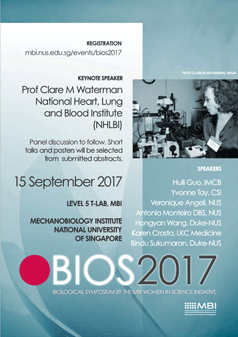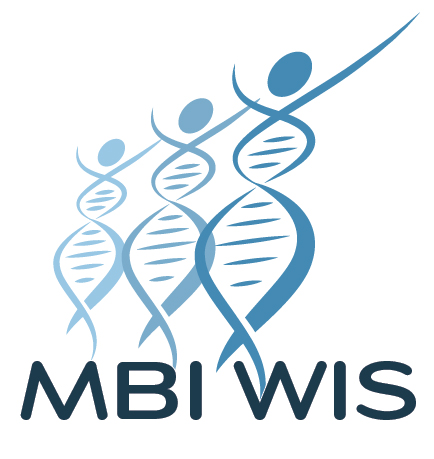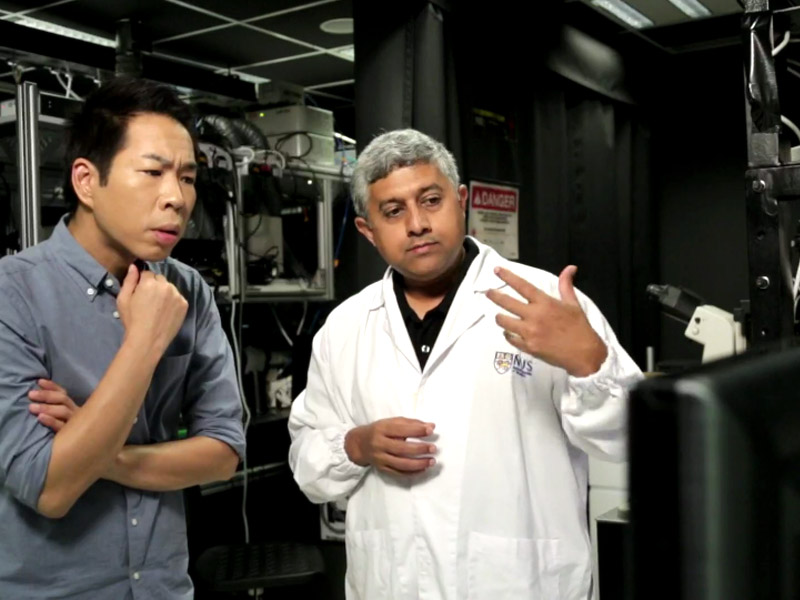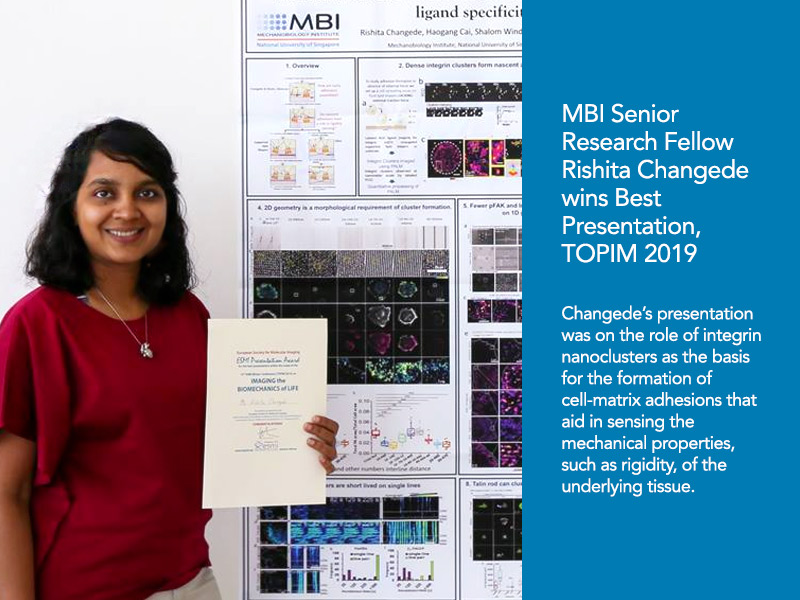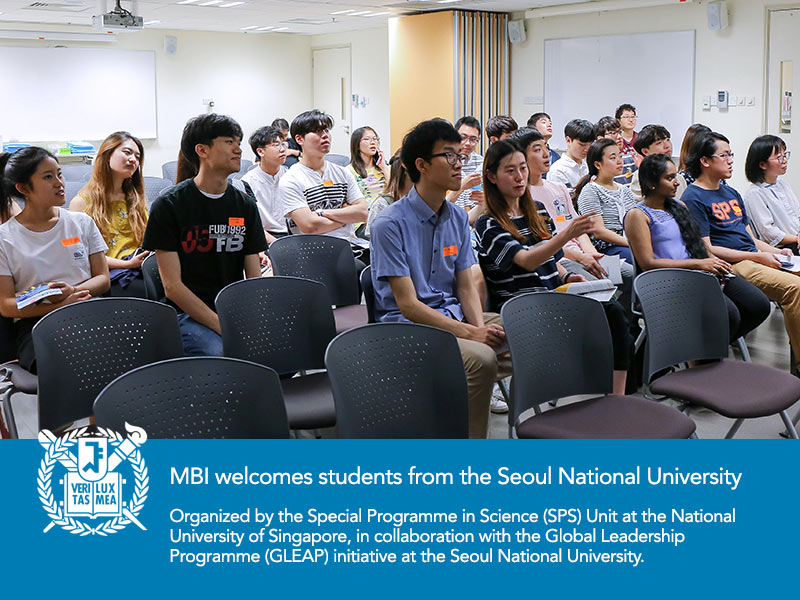2017 BIOS – Post-event report
Lakshmi Ramachandran | September 2017
The Mechanobiology Institute (MBI), National University of Singapore (NUS), hosted ‘BIOS2017’ on Friday, the 15th of September. BIOS, an MBI Women in Science initiative, is a unique national-level free biology symposium that aims to bring together women researchers in Singapore from diverse realms of life sciences research. The goal of BIOS is to promote both science and women in science. BIOS2017 brought together nearly 100 researchers, mostly women, who discussed their research, aspirations, achievements and challenges. BIOS2017 was graced with the presence of NIH Distinguished Professor Claire M Waterman, key note speaker of the event, Mr. Masaki Sato, Director of Japan Science and Technology Agency, (JST), Singapore, Professor Michael Sheetz, MBI Director, and Professor Linda Kenney, Women in Science lead at MBI.
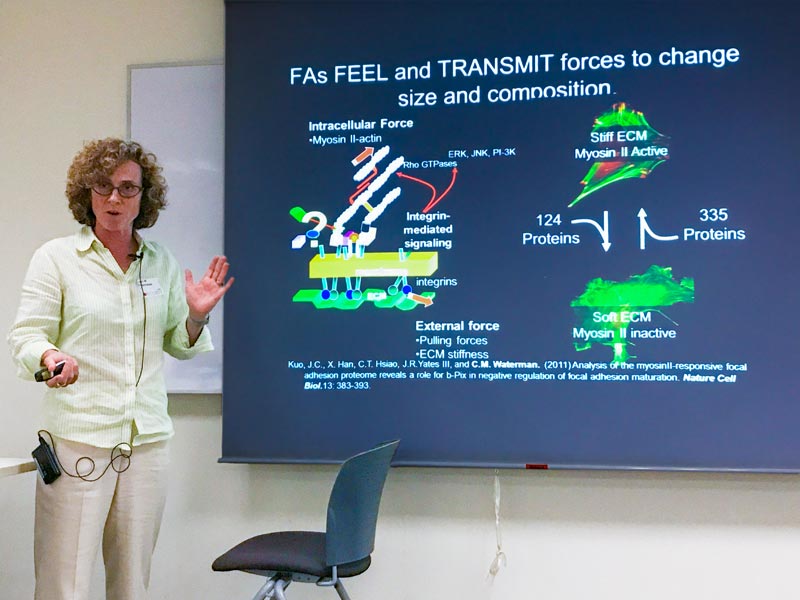
NIH Distinguished Professor Claire M Waterman at 2017 BIOS
2017 BIOS Sessions
Session I
The first session chaired by Dr. Stuti Desai, Senior Research Fellow at MBI, featured talks on infection and immunity. Dr. Bindu Sukumaran from Duke-NUS discussed the potential applications and advantages of host-directed therapies based on her group’s work on Acinetobacter baumannii infections. Dr. Veronique Angeli, from the Department of Microbiology at NUS presented the role of arterial macrophages in maintaining the mechanical function of artery in steady state partly by modulating ECM (extracellular matrix) proteins. The session ended with a short talk by Dr. Eugenia Ong from Eng Eong Ooi group at Duke-NUS on the preclinical evaluation of VIS513, a therapeutic antibody against dengue virus, in nonhuman primates.
Session II
In the second session, chaired by Minnah Thomas, graduate student at MBI, diverse topics were covered. The session started with a talk by Dr. Karen Crasta from LKC School of Medicine in which she presented how abnormal mitotic events such as mitotic slippage induces a senescent phenotype in tumor cells that renders them both tumorigenic and chemoresistant in an autophagy and p53 dependent manner. This was followed by a talk by Dr. Huili Guo from IMCB, A*STAR, who presented a novel systematic analysis on the role of ribosome heterogeneity in regulating translation. Following this, Dr.Hongyan Wang from Duke-NUS Neuroscience & Behavioural Disorders Programme presented extensive work from her group on the role of the insulin pathway in reactivating neural stem cells (NSCs) that are important for tissue homeostasis and neural regeneration. The session ended with a short talk from Rupambika Das, a graduate student in Javier Gomez Fernandez Group at SUTD, NUS, which highlighted the potential of artificial myocardium, created through a promising technique developed in their labs, to address loopholes in existing interventions to treat myocardial scars formed post cardiac arrest.
Session III
The final session, chaired by another graduate student at MBI, Liu Xuyao (Iris), featured yet another talk on RNA, by Dr. Yvonne Tay from the Cancer Science Institute, Singapore. She presented their work on miR-638, a microRNA/pseudogene, which possesses oncogenic properties in prostate cancer. Next was an interesting talk by Dr. Antonia Monteiro from the Department of Biological Sciences, NUS, on the genetics behind the evolution of butterfly eyespots. This was followed by two short talks from MBI, by Dr. Kriti Sethi, research fellow from the Zaidel-Bar group and Dr. Yang Bo, research fellow from Michael Sheetz group. While Kriti’s talk focused on the role of RHGF-1 and UNC-73, two potential activators of the small GTPase RHO-1, in contributing to the contractility of the spermatheca, Yang Bo presented avenues for cancer therapy by fixing the faulty rigidity sensing machine in transformed cells.
Keynote lecture by Prof. Claire Waterman
The series of interesting and diverse talks ended with deep insights into actin dynamics and adhesion in cell migration, delivered in the keynote lecture by Prof. Claire Waterman. She presented the mechanistic aspects of molecular clutches at Focal Adhesions (FAs) and how they function with actin to slow down retrograde F-actin flow and build traction stresses.
Focus on gender gaps in science
The next segment of BIOS2017 had a focus on gender gaps in science. As a lead-up to a panel discussion on the topic, Sarah Huggett from Elsevier Publishing Group presented a short talk on key findings from a report launched by Elsevier, Gender in the Global Research Landscape (PDF). The data presented in this report is based on an analysis of Elsevier’s indexing and abstracting database, Scopus, across 12 comparator countries. The key findings are:
- The proportion of women among researchers has increased in recent years.
- Women tend to specialize in the life and health sciences as compared to physical sciences.
- Women tend to publish slightly fewer papers than men on average. This could be because women are less likely than men to collaborate internationally on research papers and, furthermore, women are generally less internationally mobile than men.
- Women are strongly underrepresented among inventors although the proportion of women among inventors has increased in recent years.
BIOS 2017 concluded with a nice dinner reception which provided opportunities for networking and further discussions. There was also a display of pictures submitted for the ‘Gender-Bender’ photo contest which encouraged contestants to submit pictures breaking gender stereotypes in personal and work space. Read more about the panel discussion.
Conference Acknowledgements
- Linda Kenney: Organizational lead for BIOS2017
- Dee DuPuy: Webpage and poster design; organizational support
- Minnah Thomas: Registration (forms, labels, programme); organizational support
- Stuti Desai: Posters; organizational support
- Rishita Changede: Key note speaker invitation, organizational support
- Naila Alieva: Social media; organizational support
- Lakshmi Ramachandran: Funds; communications; organizational support
- Mallika Nagarajan: Organizational support
- Megan Louise Finch Edmond: Organizational Support
- Latha Krishnarajpet Shiva: Catering and Admin support
- Sruthi Jagannathan: Panel discussion notes and editing
- Sandeep Kumar: IT support


